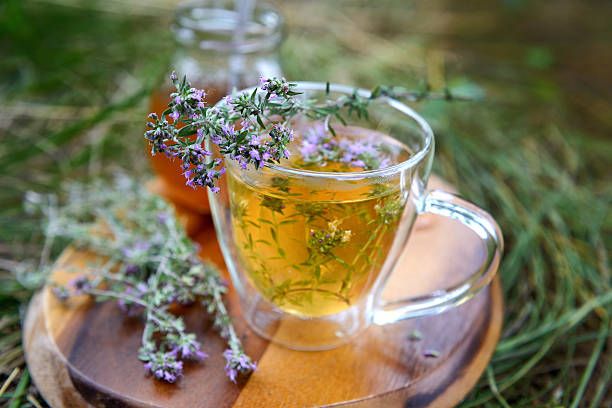
It's that thyme again and I wasn't ready :(
Blessed Risings Mystology tribe
I hope you all are more rested than me...the last few days have had me submerged in toddler slime and in a night time orchestra of dry coughs and wheezy snooring.
Yes I know your thinking how am I always harping on about herbs and all 4 of your children are sick? All I'm saying is the english weather and natures babies (as i call them) do not aggree..I'm still so unprepared. Living in a hot climate for so many years you forget about the winter nuisances. But I'm getting ready now!!
But for those of you who are a little late getting prepared for the colder season have no fear Thyme is here lol.

Thyme is a staple herb in Caribbean kitchens. We use it too season rice, meats and fish, but growing up II can't recall hearing about it medicinally.
Fast forward to the days of being accountable for my own, my relationship with thyme has changed, from a everyday seasoning to a home remedy for many things including hair wash, stomach aches, windy/gas stomach, colds/coughs, even to help manage my 'asthma'.
But for the sake of keeping today's post short an sweet.. I'm only going to share on thyme as a cold and cough remedy.
Thyme101
Common Names: Thyme , Common Thyme, Wild Thyme
Botanical Name: Thymus vulgaris
Medicinal Uses: * Aromatherapy * Congestion * Cough * Culinary/Kitchen * Cuts & Wounds * Dental/Oral Care * Facial Care * Herbal Steam * Herbal Teas * Insect Repellent
Properties: * Analgesic * Antibacterial * Antifungal * Antioxidant * Antispasmodic * Antitussive * AntiViral * Aromatic * Breath * Depurative * Digestive * Expectorant * Insect repellents * Mental Clarity * Midsummer * Mood * Nervine * Vermifuge * Warm
Parts Used: Leaves, stems and flowers
Constituents: thymol and carvacrol, rosmarinic acid
••••
Thyme is my number one go to herb when the coughing orchestra comes to our village. I guess one could say it was part of my destiny to experience the cold/mucus fighting medicinal qualities of thyme. The first year after my grandmothers passing my grandfather became very ill, he usually struggles with something called 'walking pneumonia', my grandmother would usually be the one to take care of things and nurse him back to health. But this time she wasn't physically here to do so.
Cut a long story short, my grandfather spent weeks in a Jamaican hospital, before eventually being discharged home, with tons of useless medication. Until one day I was shown thyme and onion as a cure for removing the mucus that was giving him such a hard time. And just as I was shown just as it did. And ever since my relationship with what I thought was just a basic kitchen herb changed.
Thyme is said to be one of the best herbs to use as a natural cough and cold remedy, and personally I can agree. There has been many of times, where I have had to use thyme either on its own or in a compound to provide healing for myself or others.
Traditional herbalism has seen thyme been primarily used to offer assistance/relief from respiratory dis-ease, however , thyme brings so much more to the table. It's vast library of medicinal properties include antibacterial, antifungal and spasmodic, expectorant (see above for more), not fogetting a host of naturally-occurring plant compounds—including carvacrol, borneol, geraniol, thymol, flavonoids, caffeic acid, labiatic acid, ursolic acid, oleanolic acid, saponins, apigenin, luteolin, and various flavones, all responsible for the medicinal recognition and succession of the herb.
In regards to thyme as a cold/cough supressing agent, thyme acts both as an expectorant to clear the lungs of congestion and as a antispasmodic / antitussive agent, to calm coughing spasms. Other uses for thyme include: helping to settle the stomach, aiding sleep, soothe a sore throat, offering relief from ches and pains, encouraging perspiration, promote the elimination of toxins and to bring down a fever.
So next time your feeling under the weather try sipping a warm cup of thyme tea.
Thyme Tea - how to make
•Thyme (few sprigs or desired amount)
•Water (enough to cover/boil herb)
Wash thyme, then add to a pot of boiling water. Once boiling turn off fire, cover pot with lid and leave to steep for further 10mins. Strain and drink. Add optional (non artificial) sweetner.
You can add additional cold/flu combating herbs for added benefits.
Thymely hints😉: combine thyme with nettle for allergies and mints for colds and congestion.
Thats all for now.
Stay warm and stay blessed
Peace Love Light
DISCLAIMER
This content is not intended to provide medical advice or to take the place of such advice or treatment from a personal physician. You are advised to consult your doctors or qualified health professionals regarding specific health questions you may have. Neither mystology.co.uk nor the publishers of this content take responsibility for possible health consequences of any person reading or following the information in this educational content.
